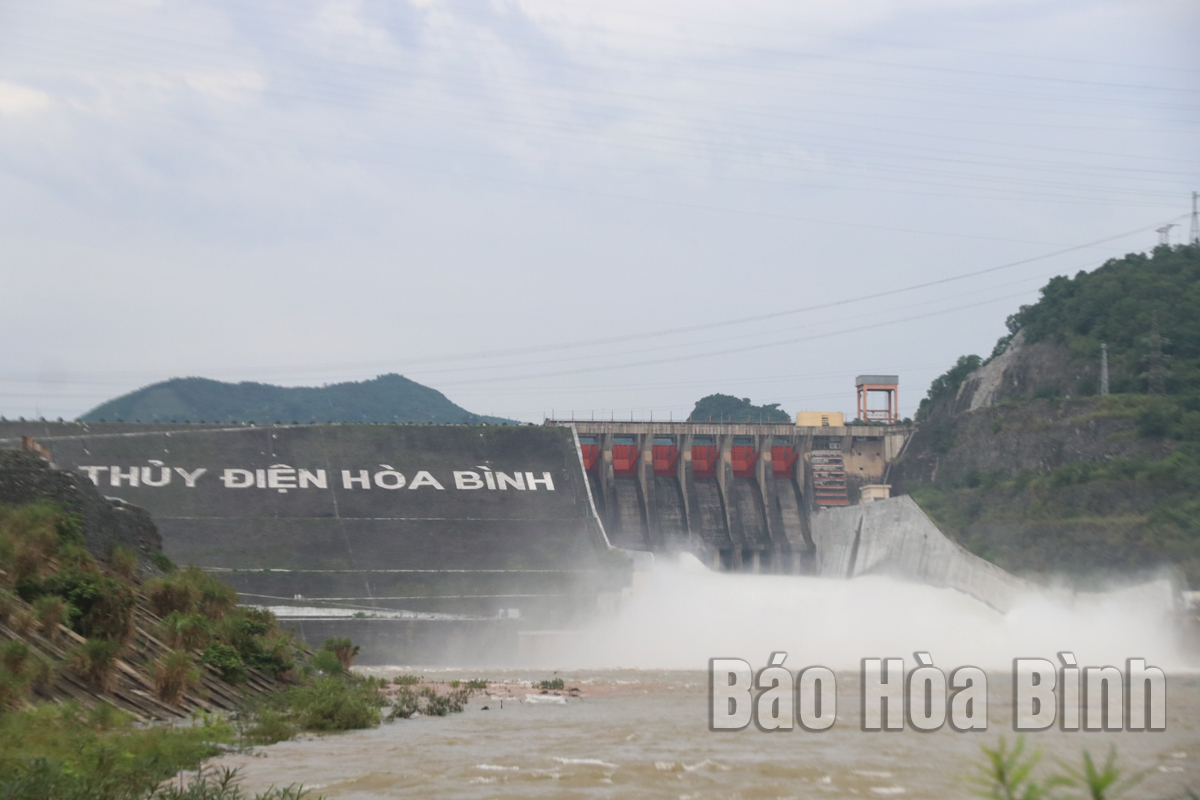
(HBO) – The Hoa Binh hydropower company opened one spillway gate at 7am on June 12 and then another at 1pm the same day. Then, 2 more spillway gate. This was the first time in 2022 that the company had to open spillway gates for reducing high water levels. The water release was carried out under the direction from the National Steering Committee for Natural Disaster Prevention and Control.
The Hoa Binh hydropower company opened the first spillway gate at 7am on June
12.
From June 11 to June 12 morning, the northern
mountainous and midland region recorded gales and downpours with rainfall of 40
- 90mm, even over 120mm in several places, according to the National Centre for
Hydro-Meteorological Forecasting.
As the Son La hydropower plant already opened a
spillway to discharge floodwater, the flow to Hoa Binh Reservoir has
approximated 5,300 cub.m. per second. The Hoa Binh hydropower plant is working
at its maximum capacity with eight turbines operating continually.
With two spillway gates opened, the water flow
from Hoa Binh Reservoir to downstream areas stood at around 5,600 cu.m. per
second.
The reservoir’s water level stood at 109.7m by
7am on June 12. Under the Prime Minister’s regulation on procedures for
inter-reservoir operation in the Red River basin, to ensure safety for the
plant and downstream areas, its water level will have to be reduced to 105m by
June 15.
Phan Van Vuong, Director of the Hoa Binh
hydropower company, said before spillway gates were opened, the firm had
notified the administration of localities, aquaculture establishments, and
waterway vehicles in downstream areas of the water discharge so that they could
gear up response measures.
As the discharge with such a large water volume
is very dangerous, he called on people not to swim in the river or fish in
downstream areas of the Hoa Binh hydropower dam./.
The Standing Board of the Hoa Binh provincial Party Committee met on March 18 to review and guide major investment projects aimed at boosting local socio-economic development.
The air is thick with the hum of drills and the clatter of machinery as the Hoa Binh – Moc Chau expressway takes shape amid the rugged terrain. Welding sparks illuminate the faces of workers, and concrete mixers churn relentlessly, laying fresh pavement on the newly-carved road. The construction site buzzes with a palpable sense of urgency, particularly in Hoa Binh province where the expressway's future is being forged.
The northern province of Hoa Binh, with over 467,000 hectares of natural forest and more than 100,000 hectares of production forest, holds significant potential for carbon credit market development.
Replacing substandard houses with more sturdy ones by June 30 is the direction given by Nguyen Phi Long, alternate member of the Party Central Committee and Secretary of the Hoa Binh provincial Party Committee, at a meeting held in early March by the provincial Steering Committee for the programme to eliminate temporary and dilapidated houses for the needy.
Recognising digital transformation as an inevitable trend, authorities and agencies in Hoa Binh have made great efforts in the work by focusing on three core pillars - digital government, digital society, and digital economy, resulting in enhanced competitiveness, improved investment climate, and ensured economic and social welfare.
In recent years, Da Bac district has improved administrative reform with a one-stop shop mechanism, streamlined inter-agency procedures, and a shift to digital platforms. These efforts have enhanced public service efficiency and contributed to local socio-economic development.



